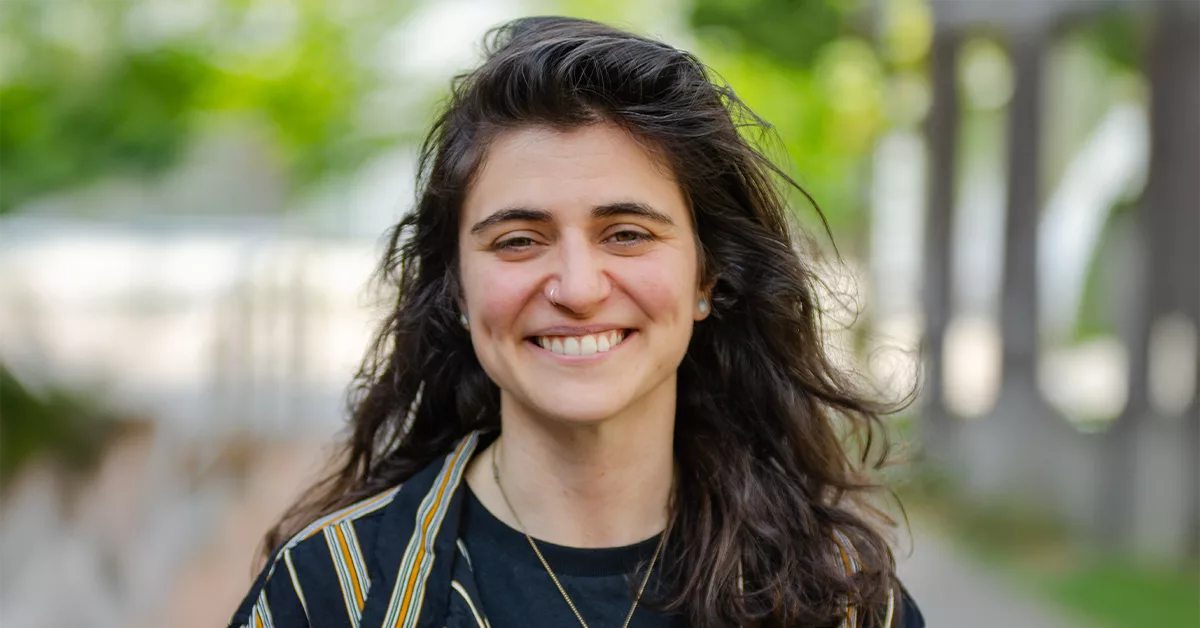
Based in Leicester, Nicole is a passionate Humanists UK volunteer who makes a real difference. In this interview, she discusses her experiences as a humanist school speaker, the impact it has had on her, and the importance of promoting tolerance and understanding in 2025.
Hi Nicole! What motivated you to become a humanist school speaker?
I was looking for a way to be active within the humanist community, as well as deepen my own understanding of humanism. I know that I would have loved to hear about humanism when I was in school, so I wanted to offer that service myself. The more worldviews that students learn about in school the better, as it broadens their perspectives and makes them less likely to develop prejudices. The non-religious are still often misunderstood, particularly in very religious schools or areas. I feel that I can help to dispel any myths that pupils might have about humanists, as well as thinking through my own philosophy through fresh eyes!
What was your first school visit like?
A bit terrifying, but great! I had prepared and made my presentation. My fears were quickly laid to rest, however. The pupils were really interested and engaged, and the teachers were really happy that they could have someone who is a real life humanist talk to the students, rather than them just reading out of a textbook. Since then, I’m always really excited to visit schools. I’ve had nothing but positive experiences – the teachers are always really interested in themselves and really appreciative, and the students ask really interesting and insightful questions.
What resonates with you most about the humanist approach to life?
I think the humanist trait that resonates the most with me is being rational, open-minded and curious; always being willing to listen to others’ opinions and experiences, and accepting that others may also have a legitimate opinion when it differs from mine. We can have interesting, open discussion, without fear of reprimand or saying the wrong opinion. I have no time for dogma, shouting others down, or arrogant security that our own opinion is the only correct one.
When I came across the definition of humanism, I realised that that was how I was already living my life, and what I already believed. The great joy, for me, was realising that this was a pre-existing, legitimate worldview, and that I wasn’t out on my own.
What was training with Humanists UK like? How did it prepare you?
I found the training really engaging and useful. There were lots of activities to practice with each other, as well as interesting lessons from experienced school speakers.
Humanism is sometimes quite hard to convey to those who don’t know or understand it – both for children and adults! The training has massively helped me to explain humanism to others both inside and outside of a school setting. The trainers gave us great ways to think about how to break down the humanist worldview into easier sections, how to convey that accurately, and activities to do to help solidify the understanding to the students.
I particularly enjoyed when we focused on difficult questions the students might ask – I’ve certainly been asked some tricky ones, but it’s now more of a fun challenge rather than a daunting task! The Humanists UK training also helped with the practicalities of working in a school – something that I wasn’t familiar with, so that put my mind at ease. The Understanding Humanism resources are brilliant and something I always refer back to when I’m visiting a school, particularly the activities for different age groups.
What would you say to someone who was curious about volunteering with Humanists UK?
I would say go for it. If you’re not sure, you can just pop Humanists UK an email! There’s a variety of ways to get involved. In my experience, the staff are lovely, welcoming, and I’ve felt really appreciated for my time. Through volunteering I feel that I have learnt a great deal about humanism, and I am always proud to be an active humanist.
Notes
Understanding Humanism is Humanists UK’s education service. It aims to introduce young people to humanism as a non-religious approach to life which can be studied as an example of a ‘non-religious philosophical conviction’. It provides teachers with the resources necessary to teach accurate, high-quality lessons about humanism, and assists them with the development of their own subject knowledge. The Understanding Humanism website offers information and activities, as well as free school speakers who can work with teachers to broaden students’ understanding. Visit Understanding Humanism at understandinghumanism.org.uk.
Interesting in inspiring young minds in your community? You can apply to be a humanist school speaker on our website.
